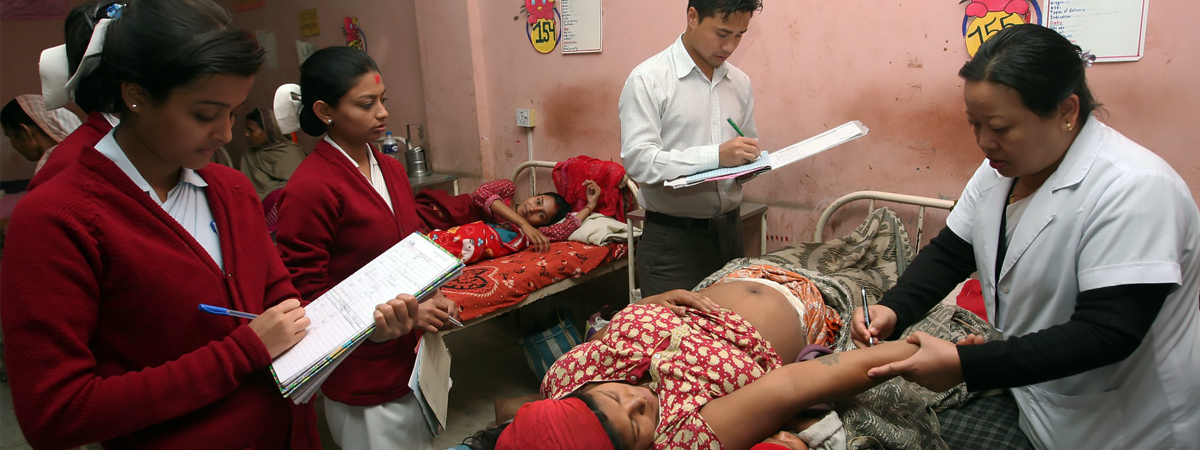EVERY year on 07 April World Health Day, which is organised by the World Health Organisation (WHO), is celebrated with the main purpose of highlighting important health issues and to raise awareness about health and wellbeing whilst drawing the attention of people from around the globe.
This year's theme 'Building a fairer, healthier world' aims to ensure everyone, everywhere is able to realise the right to good health. The WHO believes access to sufficient health care should not be a luxury reserved for the few and poor health is unfair and preventable and through this year's World Health Day will raise awareness of the inequities prevalent within healthcare.
The outbreak of the COVID-19 global pandemic has borne witness to many countries being in crisis as health care systems around the world rapidly became overwhelmed.
This was none more so than in the country of Nepal which, after adopting a new Constitution in 2015, has undergone radical constitutional reform that brought with it a complete restructure of the country's political system. This also resulted in significant changes to the country's health system placing it into a period of rapid, far-reaching and transformational change.
 Health workers in Nepal implementing the government's health sector programme
Health workers in Nepal implementing the government's health sector programme In-depth research into Nepal's health system, the reform process and the impact of federalisation has been conducted by the University of Huddersfield's Associate Dean International for the School of Human and Health Sciences and Professor of Global Health, Padam Simkhada.
Alongside his University colleague and Senior Research Fellow Dr Sharada Prasad Wasti, the pair are part of major international collaboration that includes experts in public health, law, health economics, politics and health policy, and sociology who together are closely examining the consequences for the health system of Nepal's move to a federal government structure.
The three-year project is UK-funded by the MRC, Wellcome Trust and DFID under the Health Systems Research Initiative and is a collaboration between the Universities of Huddersfield, Sheffield and Bournemouth, as well as the Manmohan Memorial Institute of Health Science and PHASE Nepal, an organisation helping to break the cycle of poverty by providing access to practical help, health facilities and education for Nepal's remote Kathmandu communities.
Professor Simkhada and Dr. Wasti's latest output of the current project is a review paper entitled Opportunities and Challenges for Effective Implementations of Karnali Province Health Policy and has been published by the Europasian Journal of Medical Sciences.
Over the next three years, the team will work with stakeholders at all levels of the health system, from the federal Ministry down to the community-level Female Community Health Volunteers. Together they will help identify good practices and implementation challenges in moving to a federal system.
A video produced for World Health Day 2021
As the WHO calls on global leaders to, "address health inequities and to ensure that everyone can access quality health services when and where they need them without financial hardship and that they can experience secure living and working conditions so that they may thrive and live a healthy life," research that raises awareness on a wide range of global health research and how it can be improved upon, such as Professor Simkhada's, could prove invaluable and be an important feature as the World Health Organisation works towards achieving their vision of building a fairer and healthier world.
Professor Simkhada and Dr Wasti, assisted by experts from Bournemouth University and Nepal's Ministry of Health and Population, have also produced a scoping review published by the Europasian Journal of Medical Sciences. of the Nepalese health system's response in fighting against the COVID-19 pandemic.
The journal article features six strands of research including the Nepalese health system's overall response to COVID-19, procurement systems around medical supply, inconsistent prevention information and messages, health of the workforce, financing and finally, leadership and governance.
The review puts forward current issues, ongoing inequities and upcoming challenges which might have to be addressed in order for Nepal's health system to deliver a united and effective response towards COVID-19.
Additional research
An additional focus of Professor Simkhada's research is looking at ways of improving the health and wellbeing of Nepali migrant workers overseas and is currently overseeing two PhD students who are in the midst of conducting research on a wide variety of migration and health issues.
He has co-authored journal articles on the impact of spousal migration on the mental health of Nepali women, the health and well-being issues of Nepalese migrant workers in the Gulf Cooperation Council countries and Malaysia. Likewise, in the WHO's South East Asia Journal of Public Health, he calls for community based mental health interventions to be made available for adolescents in Nepal left behind by migrant workers.
Closer to home, Professor Simkhada is currently heading a research project that involves collecting data in relation to the uptake of the COVID-19 vaccine among the UK's Nepali community and last year he led a team of researchers that published a review featuring the lessons learnt so far on the impact of COVID-19 on pregnant women.
As the WHO calls on global leaders to, "address health inequities and to ensure that everyone can access quality health services when and where they need them without financial hardship and that they can experience secure living and working conditions so that they may thrive and live a healthy life," research that raises awareness on a wide range of global health research and how it can be improved upon, such as Professor Simkhada's vast global health research, could prove invaluable and be an important feature as the World Health Organisation works towards achieving their vision of building a fairer and healthier world.






